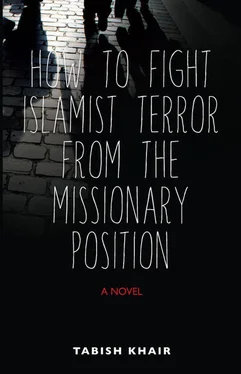“No.”
“Oh, c’mon, yaar, give it a try. It is what you Eng Lit types quote habitually when you need to talk pol-eee-ticks. I have had it quoted at me at least fifteen times, and always by Eng Lit types. I’ll give you a hint: ‘passionate intensity.’”
“The best lack all conviction, the worst are full of passionate intensity.”
“Bullseye, O Eng Lit type!” exclaimed Ravi in his best theatrical mode.
“How nightmarish,” I rejoined mockingly.
“That’s an understatement. I observed that, personally, I prefer even shorter poems. I quoted Campbell: ‘You praise the firm restraint with which they write./ I am there with you, of course:/ They use the snaffle and the curb all right,/ But where’s the bloody horse.’ You know what he said?”
“That it is a minor poem?”
“Exactly. Your perception is to be maha-commended, Eng Lit type. It proves that you are Eng Lit (Third World Category) type, so that while you too waste your life worrying about the exact shades of the two-tone shoes worn by Billy Great Shakes, you manage to notice, unlike your First World colleagues, the mud and horse shit on Shakespeare’s shoes too. You are right; your colleague, or whoever it was, looked surprised. But it is a minor poem, he said mincingly. I looked him in the eye and pronounced: it is not the missing poem that concerns me; it is the fucking missing horse.”
Then he added, as if it was an afterthought, though I realized that this was what he had come to my office to say: “Reminds me: don’t you think it is time you met Lena?”
It was then I was certain that this was different. Ravi had never offered to introduce me to any of his girlfriends in the past and that too with such brusque tentativeness.
Ravi later told me that he had finally confessed to Lena how he felt about her two days after he returned from his trip to London and Amsterdam. That trip was not just the culmination of his beard experiment; it was also his attempt to avoid making that confession to Lena. He had tried to push her away. He thought he had succeeded. But the day after he returned, he met her for coffee—knowing Ravi, it was probably a conscious testing of his will—and, as he put it, he “fell in love with her all over again, yaar.”
The very next day he had asked her to join him for lunch at the Milano pizzeria. I was surprised. Milano pizzeria was a tacky place frequented only by students.
“You mean you confessed your blooming love to her under the plaster statue of that woman, what is it, Athena-taking-to-purdah or spider-woman-entangled-in-her-own-web, hanging from the wall?” I mocked.
“The very place, bastard. But not under that statue. I said it next to the smaller one of Laurel and Hardy, by the window.” He laughed.
This is how it seems to have happened. I am putting it together now, from the various bits and pieces that Ravi revealed, sometimes unintentionally, over the next few weeks.
They had ordered the usual lunch pizza, which you get for thirty crowns, a free Coke or Fanta thrown in. Lena, being vegetarian, had gone for a margherita. Ravi, as he almost always did, had ordered a pepperoni. Lena took a Coke; Ravi a Fanta.
When I try to imagine the occasion, in my mind Milano pizzeria is not crowded. There are only four students at a far table. Not that Lena or Ravi would have noticed, I suspect. Outside, a bit of sunshine falls on the parked cars. Inside, the large TV screen up on the wall shows an MTV song, all gyrating hips and jerking boobs, being safely “radical” in the only way permitted in the West these days. Ravi and Lena do not watch the flashing images, their cascade of empty signs. They have eyes only for each other.
“She looked at me with those green eyes, and I knew what I had to say. The words might sound corny to you, bastard, but at that moment, they were the only words I could have uttered.”
Ravi’s glass of Fanta was half-full. He looked at it.
He said to Lena, “You know, one goes through life and is grateful for the love one gets and gives. It is never exactly what one has dreamed of or what one is capable of. The glass is never more than half-full. But even that is a gift; so many people do not get even that. I have been lucky in my relationships; I have had my glasses filled to half again and again, and sometimes perhaps even a bit more. I have never expected anything more.”
I imagine Ravi smiling ironically and philosophically here. Lena was looking intently into his eyes. There was an expression of surprise on her face, almost. Ravi had continued: “But when I saw you at Unibar that night, I realized for the first time that, at least for me, the glass can be full. That it can brim over. It was frightening, this knowledge. I tried to push it away. But I could not. I know now that I do not care what you feel; I am grateful to discover that, yes, our glasses can fill to the brim. That it is possible. Just that knowledge is enough, and I wanted to thank you for it.”
What had Lena said to him in reply? He didn’t tell me then. He simply told me that they were together now and that he wanted me to meet her. We agreed to meet at a seminar reception that evening, which he would be attending with Lena. But later on, I think he told me what she had said on that occasion. This was many weeks later, when matters had taken a difficult turn for all of us, and not just because of Karim Bhai.
I remember Ravi telling me then, weeks later, in a reminiscent mood, “Do you know, yaar, what Lena said when I confessed my feelings to her? She told me that she had never felt this way about a man before, that the moment she walked into Unibar, she knew she had a crush on me, that cycling back later that night, she almost hit the curb a few times because all she could think of was… you know… me.”
But by then Ravi, with his usual inability to leave matters unexamined, had started picking at vestiges of his own memory of the moment and peeling away, layer by layer, the meanings, intended or not, of a casual word like “crush.” I will have to come to that part of my story too, but in between there lies a glorious summer of love.
It was the usual kind of post-seminar reception. The bare university room, with wide windows on one side, had been arranged with tables and chairs, wooden, utilitarian, minimalist, with subdued colors, the kind of furniture that I now instantly associate with Scandinavia. The tables bore large and light aluminum trays holding open sandwiches: there were bowls of chips and bottles of soft drinks and wine. There were plastic cups and paper plates.
Ravi was late. When he walked in with Lena, I was struck by what a striking pair they made. Of course, they did not walk in as a couple; in the eyes of the assemblage, they were just PhD students coming to a reception together. But a couple is what they were: the broader beauty of Ravi’s Bollywood looks somehow matching the narrow perfection of Lena’s Nordic features; his jet-black hair set off by her cascading dark golden locks; his light-brown eyes complementing her surprisingly green ones. They did not stay together for long, as both of them knew different people in the room, and both of them came from classes where one circulates democratically.
But even when they were at opposite ends of the room, there seemed a current between them. I recognized it: there was a time when my ex and I, in the earliest weeks of our relationship, had felt something similar, much weaker but similar, about each other. This was before time had interfered, with its slow erosion of the cliffs of certainty, its full storms and hollow caves. But never had I shared something exactly like this with my ex or any woman I had been in love with. I would have been envious if I did not love Ravi like the brother I never had.
Читать дальше












